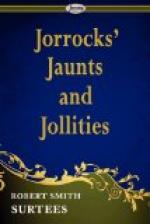“Garsoon,” said Jorrocks, after having composed himself a little during which time he was also composing a French speech from his dictionary and Madame de Genlis’s[20] Manuel du Voyageur, “A che hora [ora] si pranza?” looking at the waiter, who seemed astonished. “Oh, stop!” said he, looking again, “that’s Italian—I’ve got hold of the wrong column. A quelle heure dine—hang me if I know how to call this chap—dine [spelling it], t’on?” “What were you wishing to say, sir?” inquired the waiter, interrupting his display of the language. “Wot, do you speak English?” asked Jorrocks in amazement. “I hope so, sir,” replied the man, “for I’m an Englishman.” “Then, why the devil did you not say so, you great lout, instead of putting me into a sweat this ’ot day by speaking French to you?” “Beg pardon, sir, thought you were a Frenchman.” “Did you, indeed?” said Jorrocks, delighted; “then, by Jove, I do speak French! Somehow or other I thought I could, as I came over. Bring me a thundering beef-steak, and a pint of stout, directly!” The Hotel d’Orleans being a regular roast-beef and plum-pudding sort of house, Mr. Jorrocks speedily had an immense stripe of tough beef and boiled potatoes placed before him, in the well-windowed salle a manger, and the day being fine he regaled himself at a table at an open window, whereby he saw the smart passers-by, and let them view him in return.
[Footnote 20: For the benefit of our “tarry-at-home” readers, we should premise that Madame de Genlis’s work is arranged for the convenience of travellers who do not speak any language but their own; and it consists of dialogues on different necessary subjects, with French and Italian translations opposite the English.]
Sunday is a gay day in France, and Boulogne equals the best town in smartness. The shops are better set out, the women are better dressed, and there is a holiday brightness and air of pleasure on every countenance. Then instead of seeing a sulky husband trudging behind a pouting wife with a child in her arms, an infallible sign of a Sunday evening in England, they trip away to the rural fete champetre, where with dancing, lemonade, and love, they pass away the night in temperate if not innocent hilarity. “Happy people! that once a week, at least, lay down their cares, and dance and sing, and sport away the weights of grievance, which bow down the spirit of other nations to the earth.”
The voyage, though short, commenced a new era in Mr. Jorrocks’s life, and he entirely forget all about Sunday and Dover dullness the moment he set foot on sprightly France, and he no more recollected it was Sunday, than if such a day had ceased to exist in the calendar. Having bolted his steak, he gave his Hessians their usual flop with his handkerchief, combed his whiskers, pulled his wig straight, and sallied forth, dictionary in hand, to translate the signs, admire the clever little children talking French, quiz the horses, and laugh at everything he didn’t understand; to spend his first afternoon, in short, as nine-tenths of the English who go “abroad” are in the habit of doing.




